红黑树
概念
和AVL树一样,红黑树也是一种二叉搜索树,是解决二叉搜索树不平衡的另一种方案,他在每个节点上增加一个存储位,用于表示节点的颜色,是Red或者Black
红黑树的核心思想是通过一些着色的条件限制,达到一种最长路径不超过最短路径的两倍的状态
所以说红黑树并不是严格平衡的树,而是一种近似平衡
例如
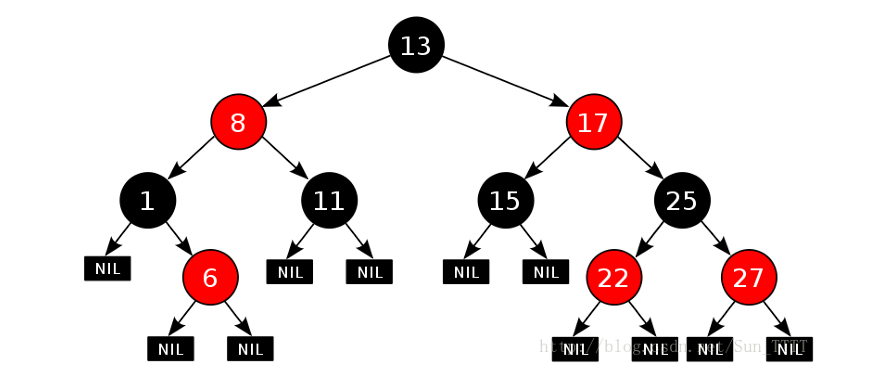
性质(条件限制)
红黑树一共有五条性质,由此来保证最长路径不超过最短路径的两倍
- 每个节点都有颜色,不是黑色就是红色
- 根节点是黑色的
- 如果一共节点是红色,那么他的子节点一定是黑色(不会出现两个红色节点连接的情况)
- 对于每个节点,以这个节点到所有后代的任意路径上,均包含相同数目的黑色节点
- 每个叶子节点(空节点)是黑色的(为了满足第四条性质,某些情况下如果没有第五条第四条会失效)
节点的定义
1
2
3
4
5
6
7
8
9
10
11
12
13
14
15
16
17
18
19
20
21
22
23
24
|
enum Color {
RED,
BLACK
};
template<class T>
struct RBTreeNode {
RBTreeNode<T>* _left;
RBTreeNode<T>* _right;
RBTreeNode<T>* _parent;
T _data;
Color _col;
RBTreeNode(const T& data)
:_left(nullptr)
,_right(nullptr)
,_parent(nullptr)
,_data(data)
,_col(RED)
{}
};
|
我们定义颜色时,使用枚举类型,可以方便且明了的看到颜色
除此之外我们默认插入节点是红色的,因为一旦插入节点是黑色,就会违反第四条规则,如果要满足的话,就要走到每一条路径上插入对应的黑色节点,代价巨大
当插入节点是红色时,有可能会违反第三条规则,但是我们可以通过变色,旋转等操作在局部进行改变,这样就能使之仍然满足条件
红黑树的结构
为了后续利用红黑树封装map和set,我们对红黑树增加一个头节点,为了和根节点进行区分,我们将头节点赋为黑色,并且让头节点的parent指向根节点,left指向红黑树的最小节点,right指向最大节点,如图
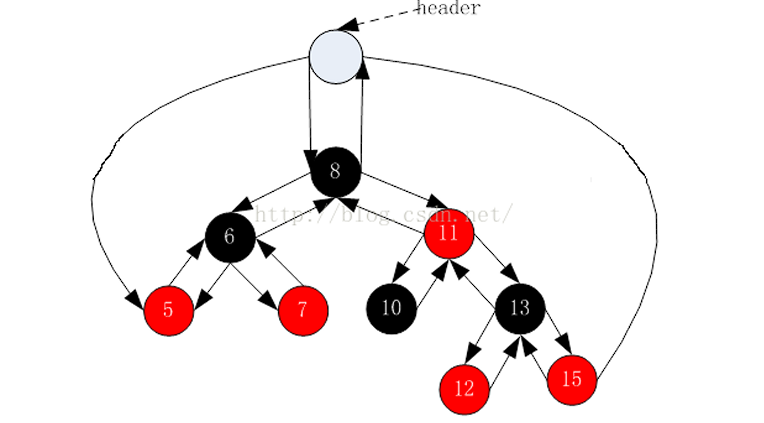
红黑树的插入
红黑树插入时也是按照二叉搜索树的规则进行插入,并在此基础上加上平衡条件,因此插入也就分为两步
- 按照二叉搜索树的规则插入新节点
- 插入节点后检测规则是否被破坏
因为插入红节点时只有可能破坏第三条规则,因此我们只需要判断父节点是否为红色即可
然后我们分情况讨论
为了方便叙述,我们约定cur为插入节点,p为父节点,g为祖父节点,u为叔叔节点
cur为红,p为红,g为黑,u存在且为红
画出来是这样的
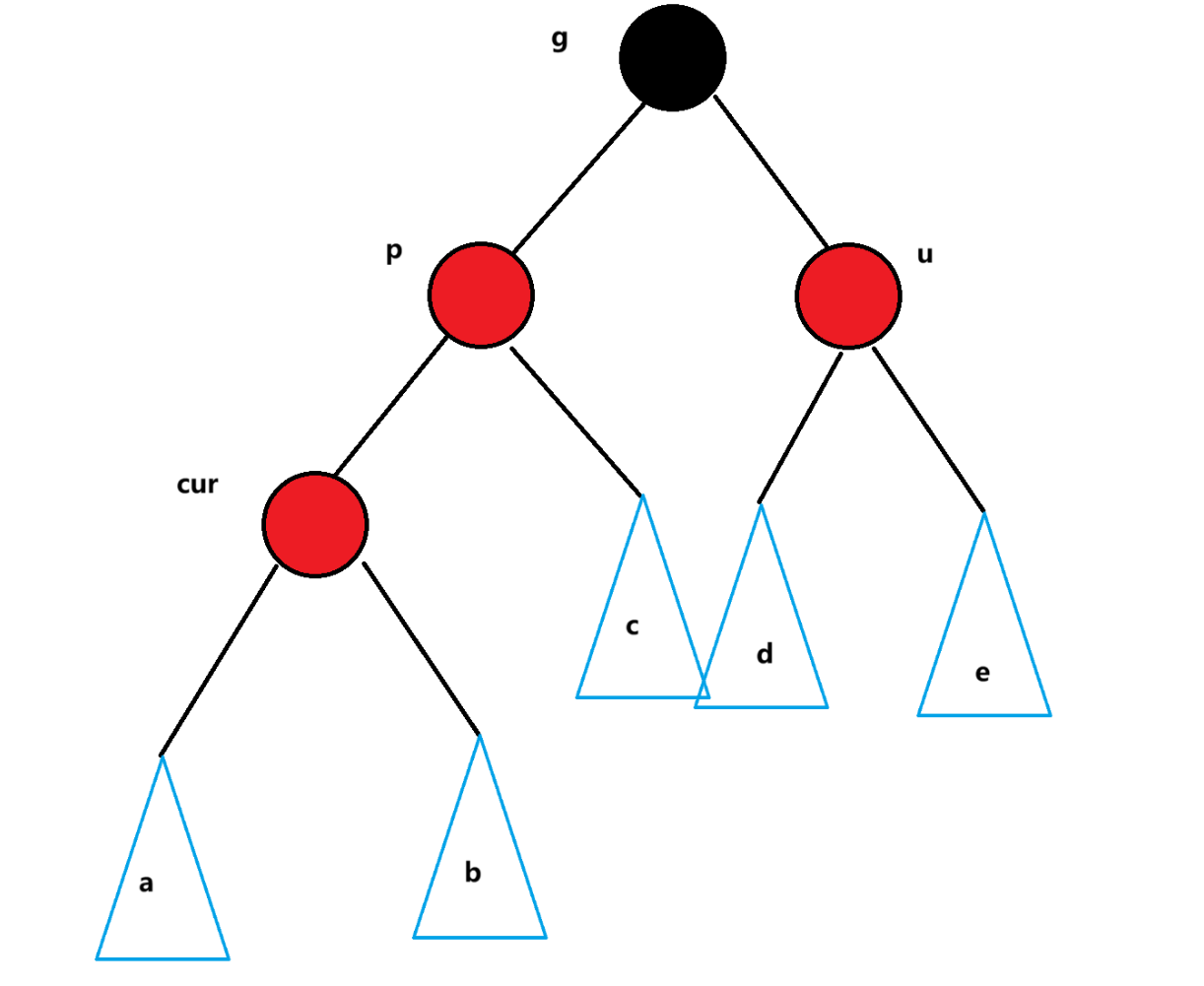
这时我们需要将g改为红色,p和u改为黑色即可,这样既能保证红色不连续,黑色数量一致,如图
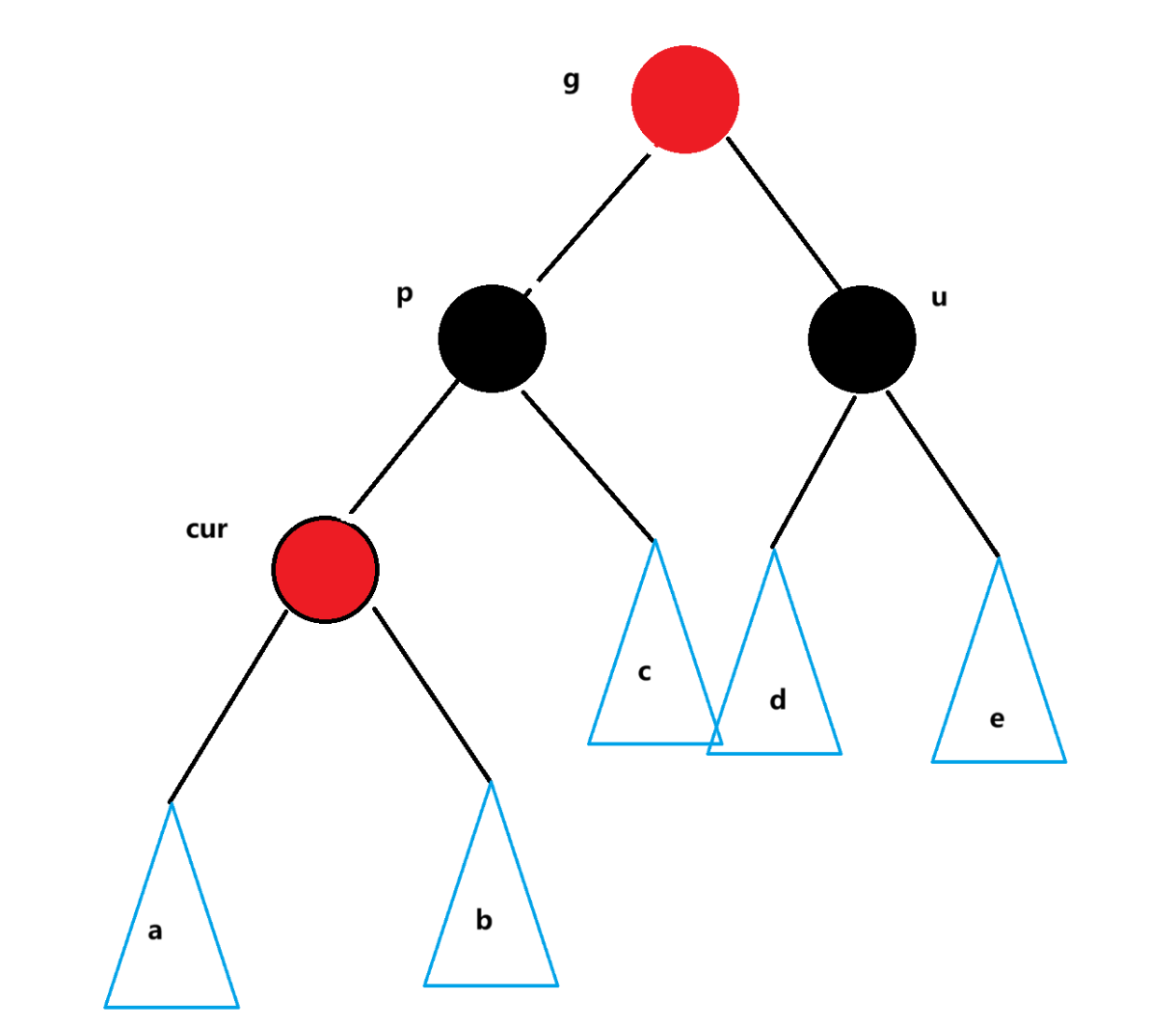
但是如果g是是子树,那么g一定有父节点,当g的父节点也是红色时,也就同样需要向上调整了
cur为红,p为红,g为黑,u不存在或u为黑,插入到p对应的一边
画出来是这样的
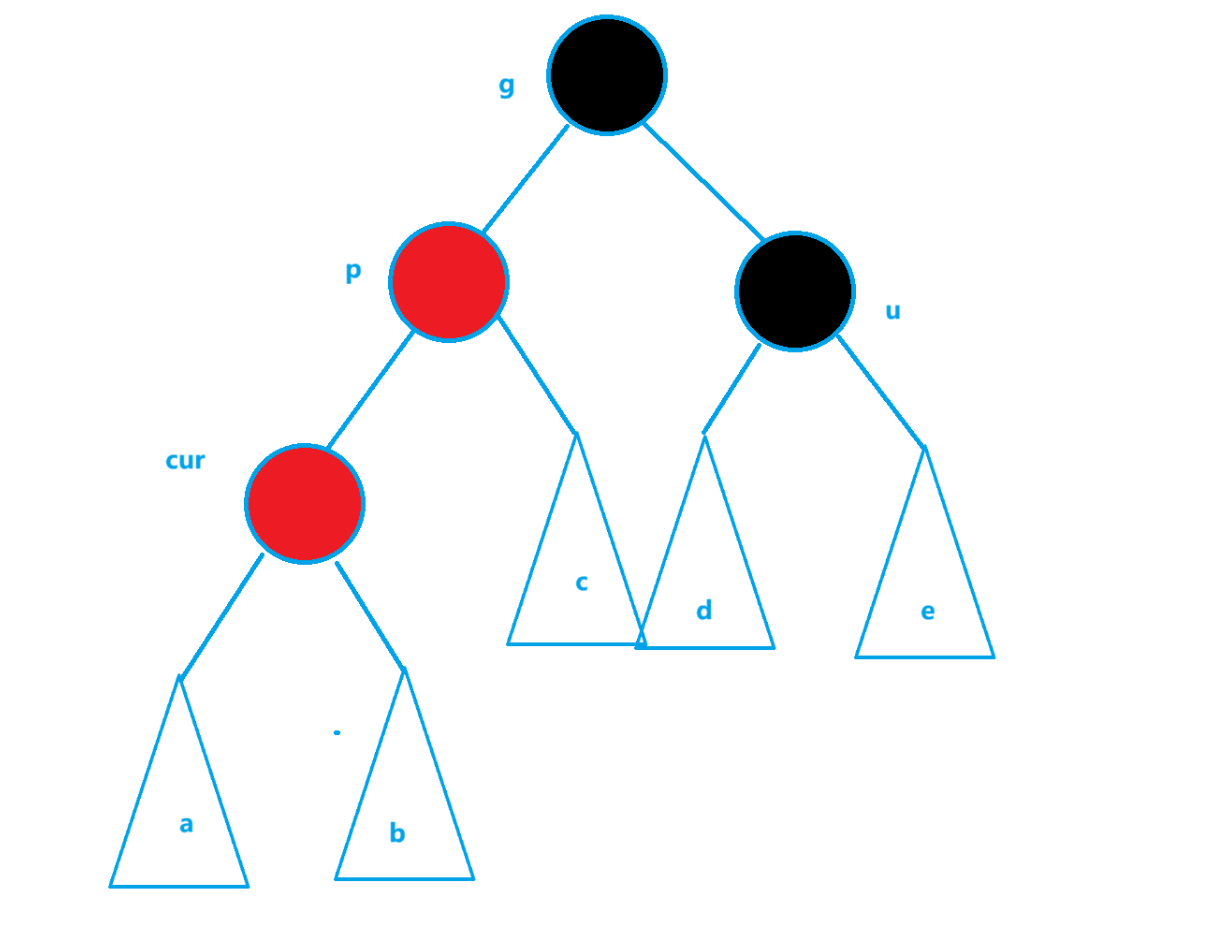
u的情况有两种
- u节点不存在,说明cur一定是新插入的节点,因为要保证左右两个路径的黑色节点的数量相同
- u节点存在,说明cur节点是由下至上调整的红色,原因也是左右路径的黑色节点要相同
对于这两种情况的调整方法是相同的,如果p是g的左节点,cur为p的左节点,则右单旋,如果p是g的右节点,cur为p的右节点,则左单旋
同时p要变成黑色,g要变成红色
变成如下状态
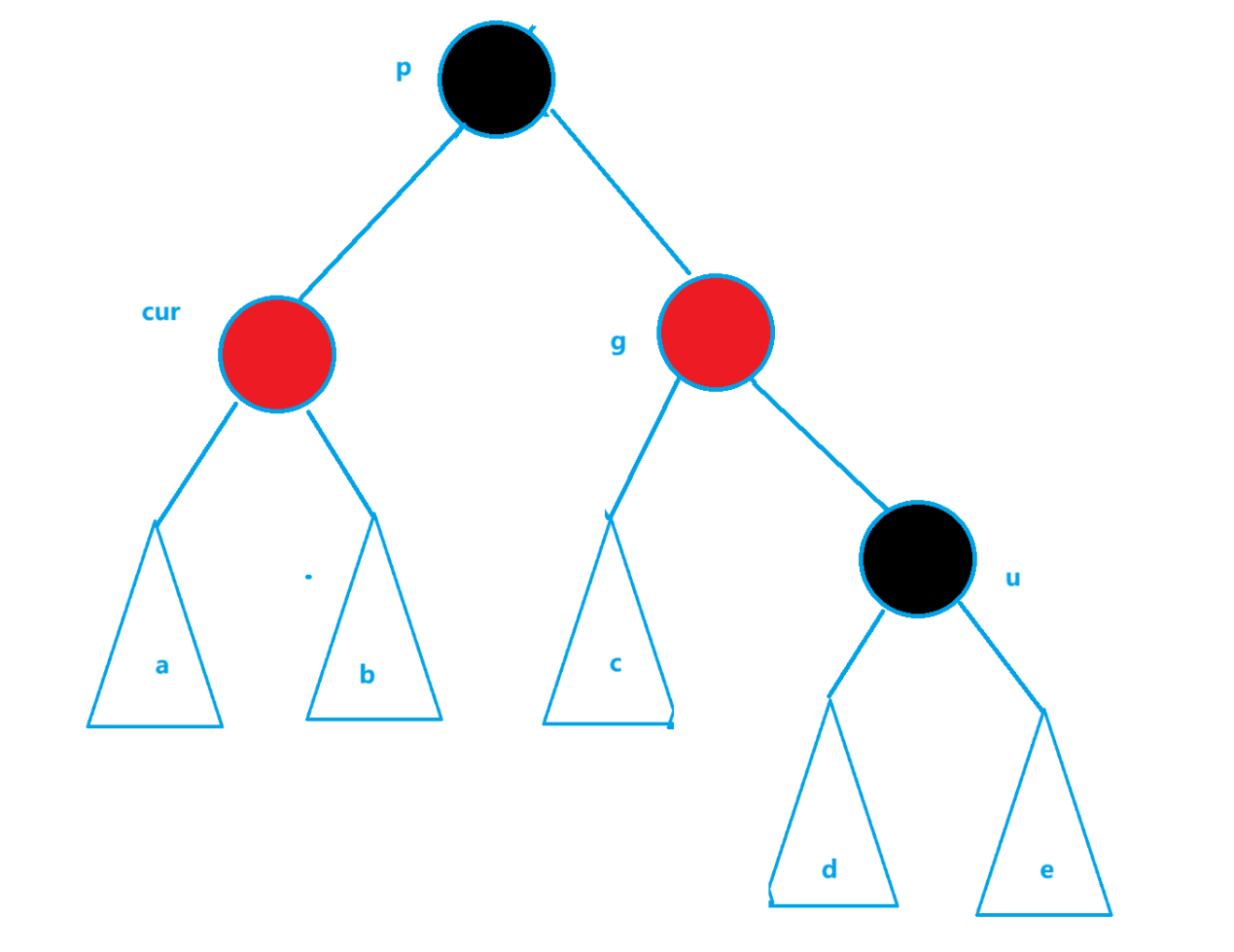
那么因为最上面的根节点颜色没有变化,也就不需要继续向上调整了
cur为红,p为红,g为黑,u不存在或u存在且为黑,插入到与p相反的一边
如图
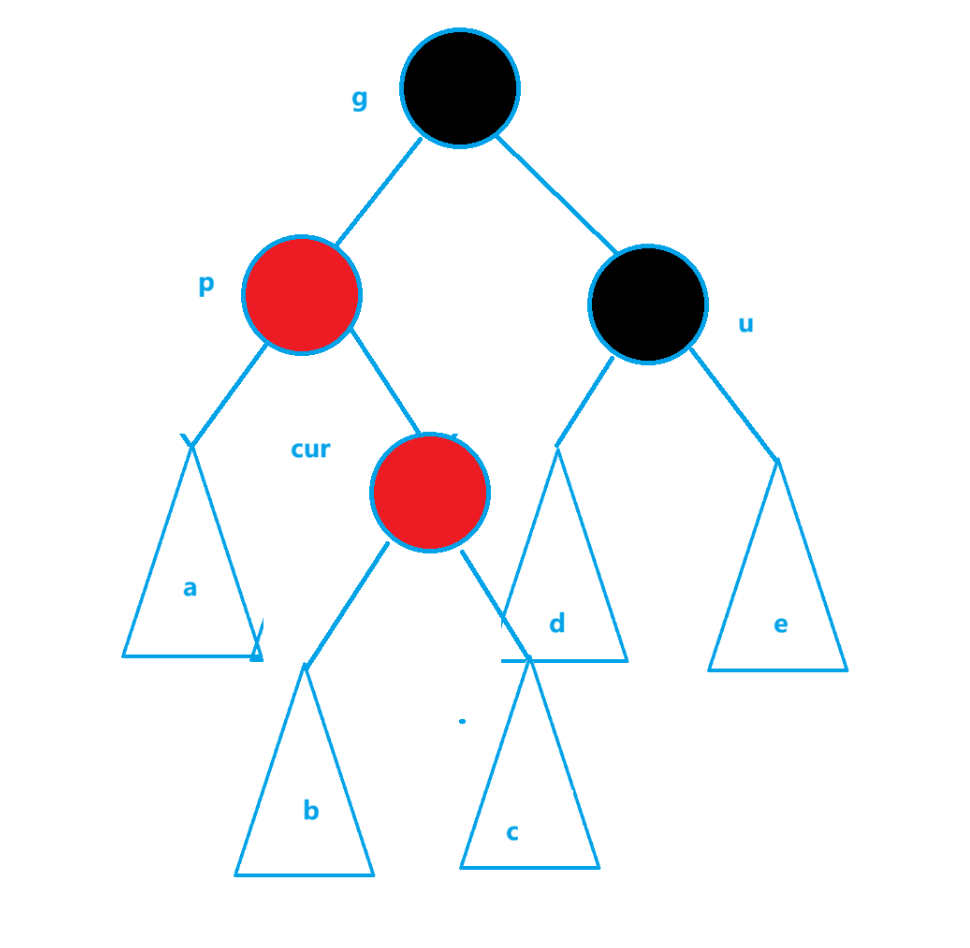
这种情况需要针对p进行单旋,如果p为g的左节点,cur为p的右节点,则对p左单旋,反之则为右单旋,此时就会变成第二种情况,再继续处理即可
第一次处理的结果如下
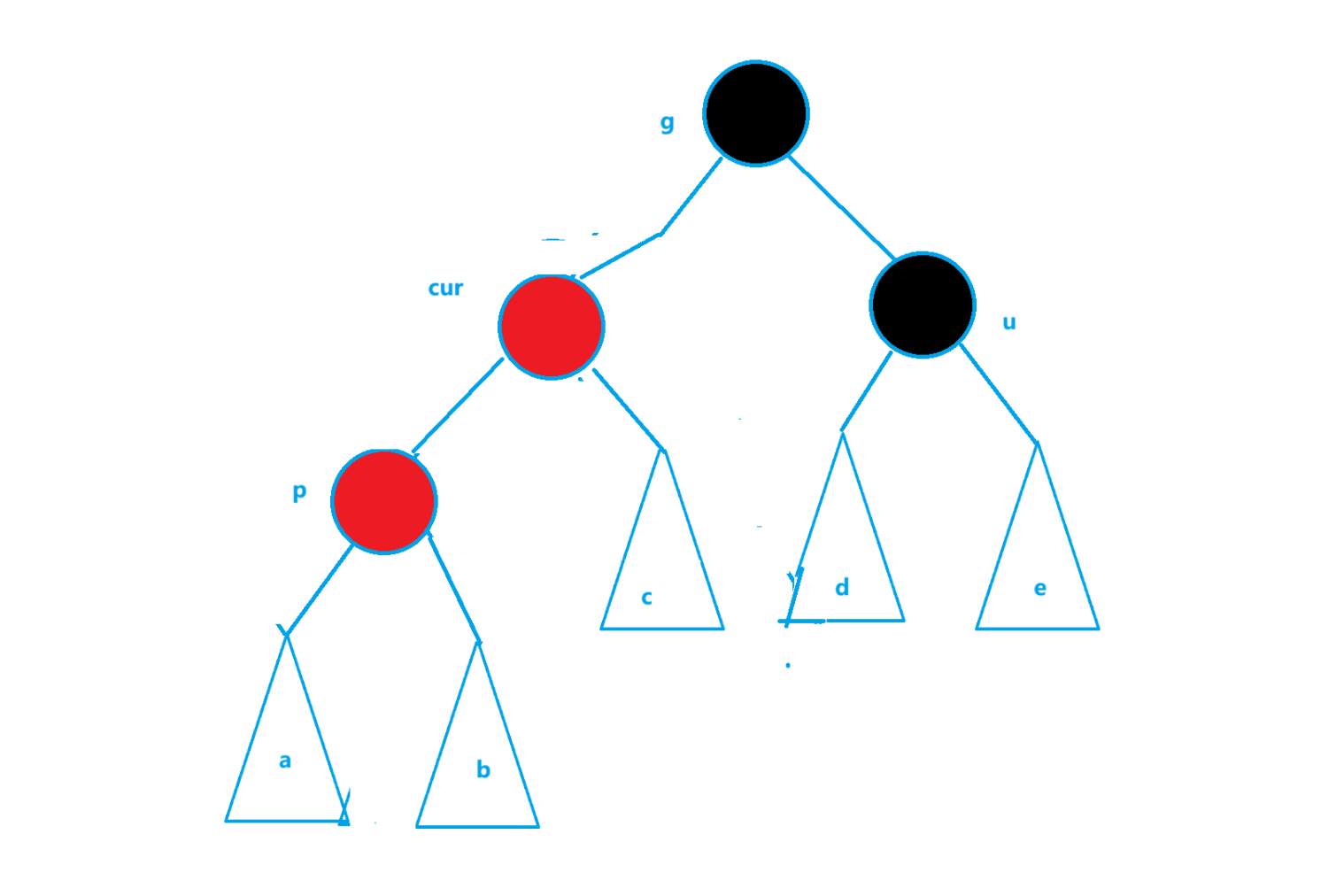
示例代码
1
2
3
4
5
6
7
8
9
10
11
12
13
14
15
16
17
18
19
20
21
22
23
24
25
26
27
28
29
30
31
32
33
34
35
36
37
38
39
40
41
42
43
44
45
46
47
48
49
50
51
52
53
54
55
56
57
58
59
60
61
62
63
64
65
66
67
68
69
70
71
72
73
74
75
76
77
78
79
80
81
82
83
84
85
86
87
88
89
90
91
92
93
94
95
96
97
98
99
100
101
102
103
104
105
106
107
108
109
110
111
112
113
114
115
116
117
118
119
120
121
122
123
124
125
126
127
128
129
130
131
132
133
134
135
136
137
138
139
140
141
142
143
144
145
146
147
148
149
150
151
152
153
154
155
156
157
158
159
160
161
162
163
164
165
166
167
168
169
170
171
172
173
174
175
176
177
178
179
180
181
| template<class K, class T, class KeyOfT>
class RBTree {
typedef RBTreeNode<T> Node;
public:
pair<Node*, bool> Insert(const T& data) {
if (_root == nullptr) {
_root = new Node(data);
_root->_col = BLACK;
return make_pair(_root, true);
}
Node* parent = nullptr;
Node* cur = _root;
KeyOfT kot;
while (cur) {
if (kot(cur->_data) < kot(data)) {
parent = cur;
cur = cur->_right;
} else if (kot(cur->_data) > kot(data)) {
parent = cur;
cur = cur->_left;
} else {
return make_pair(cur, false);
}
}
cur = new Node(data);
Node* newnode = cur;
cur->_col = RED;
if (kot(parent->_data) < kot(data)) {
parent->_right = cur;
cur->_parent = parent;
} else {
parent->_left = cur;
cur->_parent = parent;
}
while (parent && parent->_col == RED) {
Node* grandfather = parent->_parent;
if (parent == grandfather->_left) {
Node* uncle = grandfather->_right;
if (uncle && uncle->_col == RED) {
parent->_col = BLACK;
uncle->_col = BLACK;
grandfather->_col = RED;
cur = grandfather;
parent = cur->_parent;
} else {
if (cur == parent->_left) {
RotateR(grandfather);
parent->_col = BLACK;
grandfather->_col = RED;
} else {
RotateL(parent);
RotateR(grandfather);
cur->_col = BLACK;
grandfather->_col = RED;
}
break;
}
} else {
Node* uncle = grandfather->_left;
if (uncle && uncle->_col == RED) {
parent->_col = BLACK;
uncle->_col = BLACK;
grandfather->_col = RED;
cur = grandfather;
parent = cur->_parent;
} else {
if (cur == parent->_right) {
RotateL(grandfather);
parent->_col = BLACK;
grandfather->_col = RED;
} else {
RotateR(parent);
RotateL(grandfather);
cur->_col = BLACK;
grandfather->_col = RED;
}
break;
}
}
}
_root->_col = BLACK;
return make_pair(newnode, true);
}
void RotateL(Node* parent) {
Node* subR = parent->_right;
Node* subRL = subR->_left;
parent->_right = subRL;
subR->_left = parent;
Node* parentParent = parent->_parent;
parent->_parent = subR;
if (subRL)
subRL->_parent = parent;
else {
if (parentParent->_left == parent) {
parentParent->_left = subR;
} else {
parentParent->_right = subR;
}
subR->_parent = parentParent;
}
}
void RotateR(Node* parent) {
Node* subL = parent->_left;
Node* subLR = subL->_right;
parent->_left = subLR;
if (subLR)
subLR->_parent = parent;
Node* parentParent = parent->_parent;
subL->_right = parent;
parent->_parent = subL;
if (_root == parent) {
_root = subL;
subL->_parent = nullptr;
} else {
if (parentParent->_left == parent) {
parentParent->_left = subL;
} else {
parentParent->_right = subL;
}
subL->_parent = parentParent;
}
}
private:
Node* _root = nullptr;
};
|
红黑树的验证
红黑树要验证需要验证两个部分
- 检测是否中序遍历是有序序列
- 检测是否满足红黑树的性质
这里我们就不讲红黑树的删除了,完成红黑树的验证之后就算作已经完成了任务,接下来会使用红黑树模拟实现map和set
红黑树与AVL树的比较
红黑树和AVL树都是高效的平衡二叉树,但是红黑树不追求绝对的平衡,降低了插入和旋转的次数,因此性能比AVL更优,而且红黑树比AVL树的实现更加简单,所以实际中运用红黑树更多
完整代码
1
2
3
4
5
6
7
8
9
10
11
12
13
14
15
16
17
18
19
20
21
22
23
24
25
26
27
28
29
30
31
32
33
34
35
36
37
38
39
40
41
42
43
44
45
46
47
48
49
50
51
52
53
54
55
56
57
58
59
60
61
62
63
64
65
66
67
68
69
70
71
72
73
74
75
76
77
78
79
80
81
82
83
84
85
86
87
88
89
90
91
92
93
94
95
96
97
98
99
100
101
102
103
104
105
106
107
108
109
110
111
112
113
114
115
116
117
118
119
120
121
122
123
124
125
126
127
128
129
130
131
132
133
134
135
136
137
138
139
140
141
142
143
144
145
146
147
148
149
150
151
152
153
154
155
156
157
158
159
160
161
162
163
164
165
166
167
168
169
170
171
172
173
174
175
176
177
178
179
180
181
182
183
184
185
186
187
188
189
190
191
192
193
194
195
196
197
198
199
200
201
202
203
204
205
206
207
208
209
210
211
212
213
214
215
216
217
218
219
220
221
222
223
224
225
226
227
228
229
230
231
232
233
234
235
236
237
238
239
240
241
242
243
244
245
246
247
248
249
250
251
252
253
254
255
256
257
258
259
260
261
262
263
264
265
266
267
268
269
270
271
272
273
274
275
276
277
278
279
280
281
282
283
284
285
286
287
288
289
290
291
292
293
294
295
296
297
298
299
300
301
302
303
304
305
| #pragma once
#include<utility>
#include<iostream>
using namespace std;
enum Color {
RED,
BLACK
};
template<class T>
struct RBTreeNode {
RBTreeNode<T>* _left;
RBTreeNode<T>* _right;
RBTreeNode<T>* _parent;
T _data;
Color _col;
RBTreeNode(const T& data)
:_left(nullptr)
, _right(nullptr)
, _parent(nullptr)
, _data(data)
, _col(RED) {}
};
template<class K, class T, class KeyOfT>
class RBTree {
typedef RBTreeNode<T> Node;
public:
pair<Node*, bool> Insert(const T& data) {
if (_root == nullptr) {
_root = new Node(data);
_root->_col = BLACK;
return make_pair(_root, true);
}
Node* parent = nullptr;
Node* cur = _root;
KeyOfT kot;
while (cur) {
if (kot(cur->_data) < kot(data)) {
parent = cur;
cur = cur->_right;
} else if (kot(cur->_data) > kot(data)) {
parent = cur;
cur = cur->_left;
} else {
return make_pair(cur, false);
}
}
cur = new Node(data);
Node* newnode = cur;
cur->_col = RED;
if (kot(parent->_data) < kot(data)) {
parent->_right = cur;
cur->_parent = parent;
} else {
parent->_left = cur;
cur->_parent = parent;
}
while (parent && parent->_col == RED) {
Node* grandfather = parent->_parent;
if (parent == grandfather->_left) {
Node* uncle = grandfather->_right;
if (uncle && uncle->_col == RED) {
parent->_col = BLACK;
uncle->_col = BLACK;
grandfather->_col = RED;
cur = grandfather;
parent = cur->_parent;
} else {
if (cur == parent->_left) {
RotateR(grandfather);
parent->_col = BLACK;
grandfather->_col = RED;
} else {
RotateL(parent);
RotateR(grandfather);
cur->_col = BLACK;
grandfather->_col = RED;
}
break;
}
} else {
Node* uncle = grandfather->_left;
if (uncle && uncle->_col == RED) {
parent->_col = BLACK;
uncle->_col = BLACK;
grandfather->_col = RED;
cur = grandfather;
parent = cur->_parent;
} else {
if (cur == parent->_right) {
RotateL(grandfather);
parent->_col = BLACK;
grandfather->_col = RED;
} else {
RotateR(parent);
RotateL(grandfather);
cur->_col = BLACK;
grandfather->_col = RED;
}
break;
}
}
}
_root->_col = BLACK;
return make_pair(newnode, true);
}
void RotateL(Node* parent) {
Node* subR = parent->_right;
Node* subRL = subR->_left;
parent->_right = subRL;
subR->_left = parent;
Node* parentParent = parent->_parent;
parent->_parent = subR;
if (subRL)
subRL->_parent = parent;
else {
if (parentParent->_left == parent) {
parentParent->_left = subR;
} else {
parentParent->_right = subR;
}
subR->_parent = parentParent;
}
}
void RotateR(Node* parent) {
Node* subL = parent->_left;
Node* subLR = subL->_right;
parent->_left = subLR;
if (subLR)
subLR->_parent = parent;
Node* parentParent = parent->_parent;
subL->_right = parent;
parent->_parent = subL;
if (_root == parent) {
_root = subL;
subL->_parent = nullptr;
} else {
if (parentParent->_left == parent) {
parentParent->_left = subL;
} else {
parentParent->_right = subL;
}
subL->_parent = parentParent;
}
}
void InOrder() {
_InOrder(_root);
cout << endl;
}
void _InOrder(Node* root) {
if (root == nullptr)
return;
_InOrder(root->_left);
cout << root->_data << ' ';
_InOrder(root->_right);
}
bool Check(Node* root, int blacknum, const int refVal) {
if (root == nullptr) {
if (blacknum != refVal) {
cout << "存在黑色节点数量不相等的路径" << endl;
return false;
}
return true;
}
if (root->_col == RED && root->_parent->_col == RED) {
cout << "存在连续的红节点" << endl;
return false;
}
if (root->_col == BLACK) {
++blacknum;
}
return Check(root->_left, blacknum, refVal) && Check(root->_right, blacknum, refVal);
}
bool IsBalance() {
if (_root == nullptr)
return true;
if (_root->_col == RED)
return false;
int refVal = 0;
Node* cur = _root;
while (cur) {
if (cur->_col == BLACK) {
++refVal;
}
cur = cur->_left;
}
int blacknum = 0;
return Check(_root, blacknum, refVal);
}
int Height() {
return _Height(_root);
}
int _Height(Node* root) {
if (root == nullptr)
return 0;
int leftH = _Height(root->_left);
int rightH = _Height(root->_right);
return leftH + rightH;
}
size_t Size() {
return _Size(_root);
}
size_t _Size(Node* root) {
if (root == nullptr)
return 0;
return _Size(root->_left) + _Size(root->_right) + 1;
}
Node* Find(const K& key) {
Node* cur = _root;
while (cur) {
if (cur->_data < key) {
cur = cur->_right;
}
else if (cur->_data > key) {
cur = cur->_left;
}
else {
return cur;
}
}
return nullptr;
}
private:
Node* _root = nullptr;
};
|








